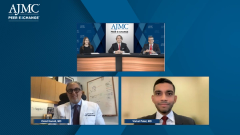
Targeted Therapy: Hedgehog Inhibitors in BCC
The panel examine toxicity and morbidity considerations for the use of hedgehog pathway inhibitors in BCC.
Episodes in this series

This is a video synopsis/summary of a Peer Exchange involving Jason Luke, MD, FACP; Christopher Barker, MD; Omid Hamid, MD; Vishal Patel, MD; and Catherine Pisano, MD.
Hamid discussed the importance of hedgehog pathway inhibitors in advanced basal cell carcinoma (BCC), though their toxicity often limits tolerability. He noted immunotherapy approval in BCC requires hedgehog inhibitor progression or intolerance. Barker explained these agents have higher response rates than immunotherapy in unresectable BCC. Thus, neoadjuvant hedgehog inhibitors can facilitate subsequent surgery/radiation in poor candidates by shrinking tumors, though durability is limited by toxicity. If local therapies remain unfeasible, checkpoint inhibitors are utilized. Barker cited an ongoing trial of neoadjuvant hedgehog inhibitors followed by combined inhibitors and radiation with promising early results, though comparison to neoadjuvant immunotherapy is needed. Luke asked whether radiation influences subsequent immunotherapy efficacy. Barker stated that while some hypothesize prior radiation may impact tumor sensitivity, available data does not suggest radiation therapy clearly alters checkpoint inhibitor outcomes. However, long-term effects of radiation on the tumor immune microenvironment warrant additional study regarding interactions with immunotherapy.
Video synopsis is AI-generated and reviewed by AJMC® editorial staff.
Newsletter
Stay ahead of policy, cost, and value—subscribe to AJMC for expert insights at the intersection of clinical care and health economics.










